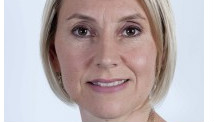SCOTTSDALE, Ariz. (AP) — Amanda McCarthy was a nervous wreck in the stands. Her husband was as calm as could be on the mound.
Brandon McCarthy methodically struck out four in two innings in his first game since a horrific head injury, an impressive return that overshadowed all else in the Diamondbacks' 14-6 loss to the Cincinnati Reds on Wednesday.
McCarthy, signed to a two-year deal by the Diamondbacks as a free agent, gave up one run on three hits. He had not taken the mound in a game since Sept. 5 when he was struck in the head by a line drive off the bat of the Angels' Erick Aybar while pitching for Oakland. McCarthy sustained an epidural hemorrhage, brain contusion and skull fracture.
Reds ace Johnny Cueto, in his first start since he was injured early in last year's playoffs, went two innings, allowing four runs, two earned, on five hits with a strikeout and a walk.
Amanda McCarthy, something of a celebrity in her own right with more than 26,000 Twitter followers, had been unusually quiet on her Twitter account as game time approached.
"I was pretty nervous. I was kind of getting shaky," she said. "My girlfriends were trying to distract me and talk to me. I'm not a very nervous person in general when he pitches, but obviously this is a unique situation."
Then she watched her husband strike out Billy Hamilton, Joey Votto and Ryan Ludwick in the first inning.
The only blemish came when rookie center fielder Adam Eaton got a late break on Denis Phipps deep fly ball off McCarthy leading off the second and it went over his head for a triple. Neftali Soto brought Phipps home with a sacrifice fly, then Jack Hannahan was caught looking for McCarthy's fourth strikeout.
"I felt my rhythm was good, my game pace was good," McCarthy said, "all the things I'd like to have even later in spring I felt were good."
The tall right-hander, working to add a changeup to his repertoire, threw 31 pitches, 22 strikes.
"He was awesome," his wife said. "Did he strike out like a million?"
McCarthy said he had no mental hurdle to clear and felt no more nervous than he did approaching any other spring training opener. He said he refuses to dwell on what was a life-threatening injury or even reflect on it, except when he is asked about it.
"I would assume it becomes less of a hot issue, less questions about it, or at least they'll kind of thin out, which is a good thing," he said. "For me it really can't get more behind me than it is, but just in terms of answering questions about it, it will probably go away. But I think I'll always kind of be 'that' guy, to a point where that's just one of the defining markers. I have to try and pitch well enough to get out of that but it will always kind of be there."
McCarthy joked that he might reflect a bit more if he goes on to have an outstanding career.
"That's when you make a ton of money on the motivational speaker's tour. I'll cash in then," he said. "But otherwise I want it to be a footnote at best. It's just something that happened, something that was scarier for the fans or my family than anybody else. That's it for me. It was just a bad day and not a great pitch."
There were no sharp comebacks to the mound for McCarthy to deal with, but he must know that will come.
"When that one came back straight that went way into center I thought he was going to hit the deck, because I did," his wife said. "But he looks good. I know that he knew what he was doing, and he wouldn't get out there if he felt uncomfortable."
Cueto, ordered by the Reds not to participate for the Dominican Republic in the World Baseball Classic that begins next week, made his first game appearance since he went down with a strained right oblique eight pitches into last season's NL division series against San Francisco.
He brushed aside the results and said he was just glad to be back on the mound and feeling good.
"That is just what I wanted to do, get out there and pitch to hitters," Cueto said. "I threw about 40 pitches. I didn't feel my oblique. I felt nothing in it. I gave up some hits but I was able to throw what I wanted to, thank God."
The first of Aaron Hill's two doubles drove in two runs off Cueto after three-time Gold Glove second baseman Brandon Phillips bobbled a double-play grounder in the opening inning.
A Reds lineup of mostly minor leaguers outscored its Arizona counterpart 13-2 over the last four innings.
NOTES: Because Cueto finished the season injured, the Reds had the right to block his participation in the World Classic. ... Arizona C Miguel Montero was back in the lineup after missing two games with a swollen right thumb. ... Phillips, who figures to be the everyday second baseman for Team USA in the World Baseball Classic, had five errors all of last season. ... Team USA is scheduled to hold its only pre-WBC workout Monday at Scottsdale's Salt River Fields, the spring home of Arizona and Colorado.



